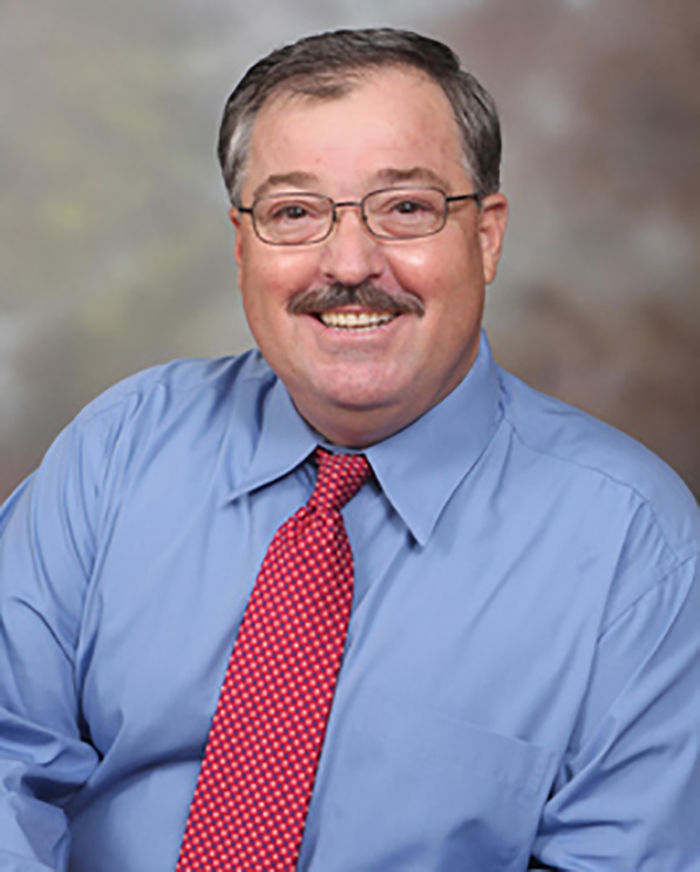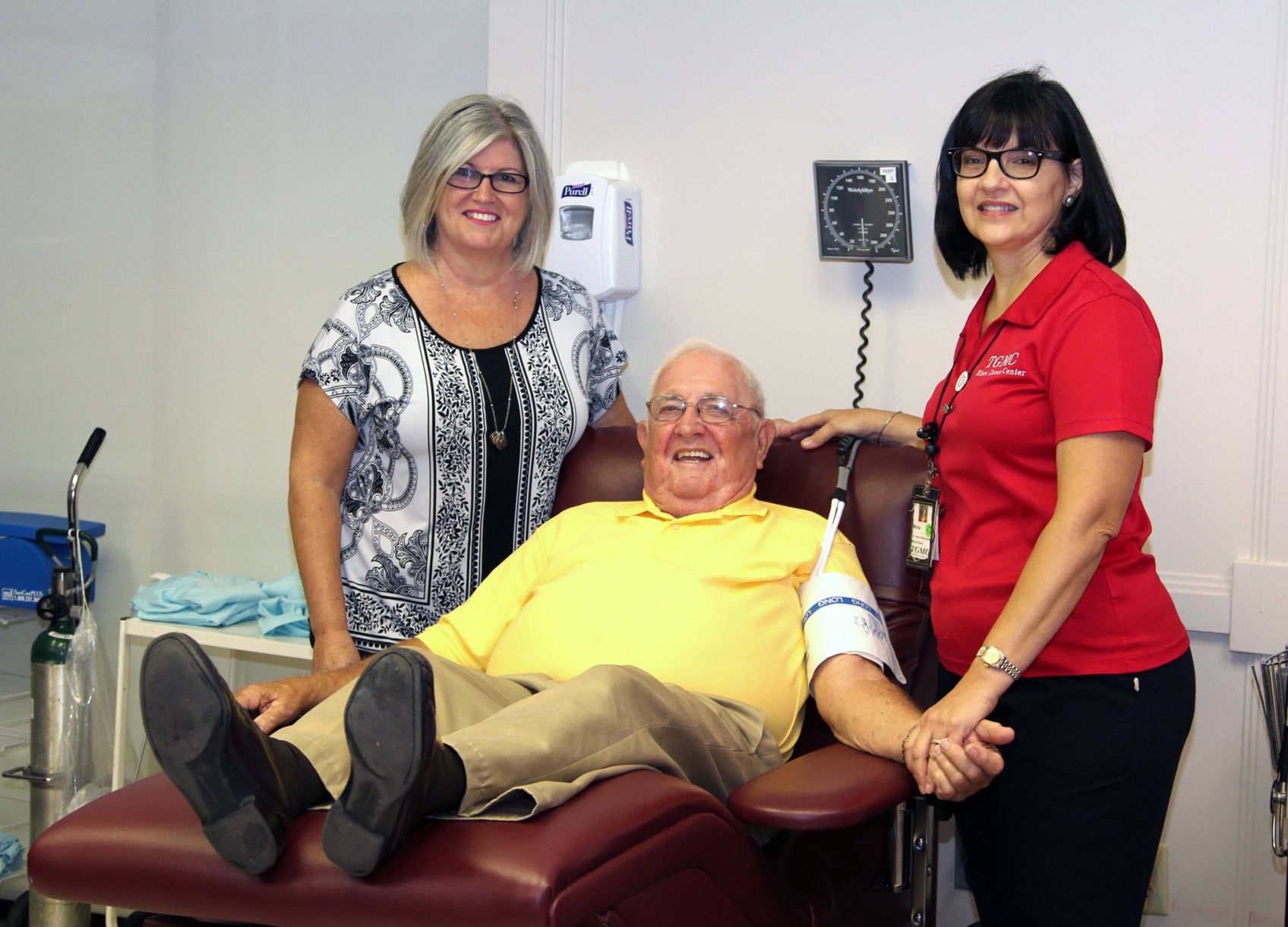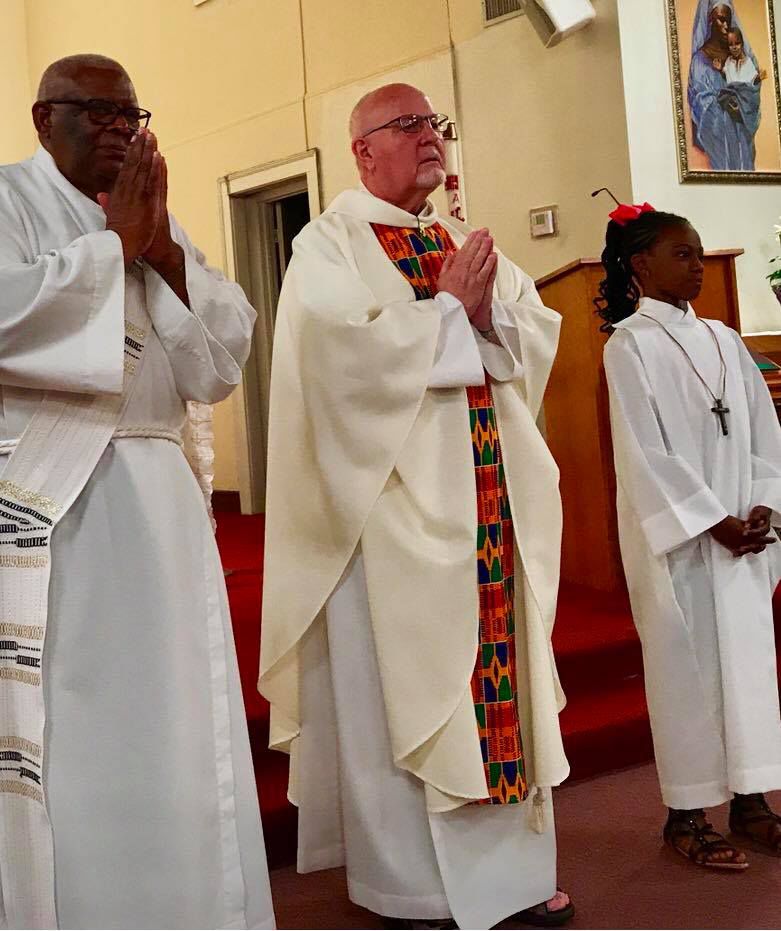
Expose Dat case settled for good
September 11, 2017
Bloody Tuesday: Houma man hits donation milestone at TGMC
September 12, 2017A Catholic priest whose social justice-themed sermons rankle some and inspire others has been relieved of his ministry by church officials, who say the decision was necessitated by a combination of issues during his 2 ½ year tenure.
The move leaves without a shepherd for now two churches with traditionally black congregations – St. Lucy’s in Houma and St. Luke’s in Thibodaux, but officials at the Diocese of Houma-Thibodaux Saturday stressed a continued commitment to both, while supplying no firm details of reasons for the decision.
Interviews with parishioners active within both churches indicate that conflicts with some black lay elders and controversy generated by words highly critical of institutions and public officials, unpopular with some whites, were the subject of complaints to the diocese, resulting in an unusual action that has left some congregants fuming and others elated.
“The Diocese of Houma-Thibodaux is grateful for Father Carl Diederichs and his service to the people of St. Luke’s, St. Lucy’s, and the Catholic community in south Louisiana,” Bishop Shelton Fabre said, in a statement given to The Times Saturday night. “The Diocese is not of the position, nor has it been our practice, to discuss employee or personnel issues. Realizing the need for renewed pastoral leadership within the communities of St. Lucy’s and St. Luke’s, we look forward to announcing the details of the future leadership as soon as those details are able to be made public. I want to assure my brother and sisters at both St. Luke’s and St. Lucy’s that I remain committed to the on-going and long-term viability of both communities. I assure both communities that we will continue to build on their rich history within the black Catholic community as together we look forward to our future.”
As word trickled through the congregations a petition drive emerged, as supporters of Diederichs seek to have Bishop Fabre reconsider his decision.
The 77-year-old Diederichs, who is white, expressed disappointment that he will be unable to complete what was to have been a five-year commitment to tend the majority black churches. He confirmed that he will be returning to Marytown, Wisconsin, the town where he grew up, for now. His hope is to eventually tend to the spiritual needs of minority congregations in the future.
“I am grateful to the bishop for having me come in the first place and the great friendships I have made at both churches,” Diederichs said. “I am still upset in terms of management, that anonymous critics would have the day.”
Diederichs said that although he has made his plans, a reversal of the decision would be welcomed. Some congregants suggested that perhaps arrangements could be made to keep Diederichs at St. Luke’s, where his homilies do not appear to stir ire, as the administrative issues are negotiated.
The demographics and histories of both churches make for a sensitive scenario.
Established in 1947, St. Lucy’s was conceived out of a desire to reclaim hundreds of fallen away black Catholics in the Houma area. Leaders of the lay community including Judge J. Louis Watkins were heavily involved in site selection and construction efforts for both a church and a school.
Nearly two decades later, in 1966, St. Lucy’s was closed ostensibly “to further the cause of integration.” Dealing yet again with the issue of black Catholics drifting to other denominations rather than attending other Catholic churches, the late Bishop Warren Boudreaux guided a re-opening in 1986, with the help of priests from the Josephite order, a church history says, meeting “the true need and ardent desire of black Catholics to worship in the cultural setting of their African-American heritage.”
St. Luke’s in Thibodaux was also born with a school, in 1923, but was closed in 1967. Bishop Boudreaux resurrected that church as well in 1986. Both St. Luke’s and St. Lucy’s shared a pastor in later years, with a residence at the latter. Among prior joint pastors was the Very Rev. Mark Toups, now Vicar General of the Houma-Thibodaux Diocese.
Over many decades, issues like the church closures strained trust between some black Catholics and the larger institution of the Church; complicating matters was the growth of white church-goers at St. Lucy’s while St. Luke’s in Thibodaux retained an almost exclusively black congregation.
While not supported unanimously by black congregants, Father Carl’s homilies, which urged action in the face of injustice – particularly concerning issues of race – were largely appreciated by them at St. Lucy’s. Some white parishioners found those homilies difficult to digest.
“This is stirring up our churches,” said a white former parishioner of St. Lucy’s, Elray Foret. “He is a liberal and if I want to listen to the news I’ll turn on the radio not go to church … He is a liberal and he is a troublemaker.”
Foret also alleged that when challenged Diederich’s gave a curt response to his wife.
Praise from the pulpit for President Barack Obama and homilies critical of minority treatment by police were deemed inappropriate by Foret and some other whites. The pews some vacated at St. Lucy’s were not filled by new faithful, causing concern among some black elders.
Meanwhile at St. Luke’s a firm hand on the matter of finances such as expectation of prompt return of receipts from fund-raising efforts by volunteers caused some long-time black congregants to balk. Diederichs gained a reputation for having a heavy hand with some matters. The congregation, having supported the church directly through their contributions and efforts, in some cases felt the priest overstepped his authority. Inferences drawn through sermons that Diederichs was not a fan of unbridled capitalism drew other criticism.
In private discussions church leaders have acknowledged contact from those troubled by Diederichs’ message. Diederichs himself acknowledges admonitions to use discretion, particularly in social media posts. But matters of external politics and policy, officials indicated, were not by themselves enough to spark such a decision. Rather it was an untenable combination of factors that added up, as Diederichs said he was told, to a situation summarized as “not working out.”
The Bishop’s official response was of little comfort to the parishioners who have found themselves refreshed and vindicated by Diederichs’ sometimes blunt messages, which have consistently drawn applause in the midst of the mass. Some who now mourn his departure acknowledge that they have not always agreed with his conclusions, but that his words have challenged them to greater critical thinking, and closer internal examinations of how current events relate to the ministry of Jesus Christ, as indicated in scripture, as well as the mission of the Catholic church and the responsibilities of community. They see a decision made without open discussion or inclusion of parishioners as a breach of faith that opens old wounds, challenging the trust some blacks have had with an institution characterized as more responsive to the desires of the larger white community.
“I support my priest, he encouraged St. Luke and St. Lucy to begin the ‘Year of Encounter with Pope Francis,’ this series (which) discusses social justice issues,” said Thibodaux educator Al Carter. “This most recent discussion brought members of St. Luke and St. Joseph together to face our feelings on race relations. It was a great program that opened the hearts of all present. This is why we need Priests like Father Carl in our area and the Catholic Church.”
“I find this very distressing, considering that he is the only Priest that I am aware of in this area bold enough to address social justice issues,” Carter wrote in a Facebook post. “He also speaks out strongly against racism. Father Carl reminds me of those Catholic Priests that walked hand in hand with Dr. Martin L. King, Jr. during the civil rights struggle. He is also a great preacher, teacher and a trusted friend.”
The encounter sessions referred to by Carter are part of a program – established by churches at the invitation of Pope Francis – to formalize community discussion of issues of exclusion.
“How Our Criminal Justice System Excludes People” was the theme of an encounter program hosted in June. Some church members said the nature, even the name, of the discussion caused some difficulty.
Deneen Stevenson, a St. Luke’s parishioner who gathered petition signatures Saturday and Sunday, expressed great distress at Father Carl’s dismissal. His counsel and example, she said, kept her in the church when she was having a crisis of faith.
“As a Catholic our teachings are given to us by a shepherd because we are lost sheep, but here we are penalized by the same people who are sending out these shepherds to catch the flock,” Stevenson said. “We are taught peace and love and forgiveness to speak out when something is wrong, but if we speak out we are then punished.”
A community gathering at which the Bishop might have discussed his plan but then sought opinions from the faithful, Stevenson and others said, could have gone a long way to keep faith and trust alive. This, they said, would have been the case even if the ultimate decision was that Diederichs would have to go.
“We are a family,” Stevenson said. “When there is a problem in the family we need to talk about it, out in the open. But they did not deem it fit to come to us.”
Criticism of the decision was evident on social media.
“If you are going to make a bold decision on the opinions of a few, that is poor leadership,” posted parishioner Vee Park. “It is always best to get the feedback of all involved. However, it makes you wonder if the complacent are mad because fires were being lit that many prefer not to see lit for they’d rather see you uninformed and uninspired…or staying in your place. If you decide to make a decision that affects two congregations, be a man who stands behind your decision and tell those affected that you made the decision and why. Priests are changed at St. Luke very often, which lends one to believe that consistency and growth are not valued or encouraged in a church attended by mostly people of color. Leadership and intent definitely need to be called into question.”
One church elder, contacted Saturday and told that his pastor would be leaving, expressed shock.
Sylvester Jackson of Thibodaux, who serves on the St. Luke’s Finance Committee, said he was at a loss to explain how such a decision could be made. •










